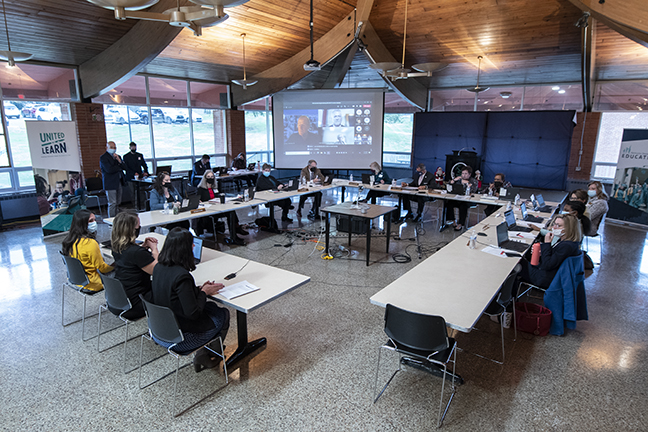
The Kentucky School for the Deaf (KSD) had the opportunity to host the Kentucky Board of Education (KBE) on its campus for the board’s regular meeting on Dec. 1. As part of a packed schedule, the board approved a regulation relating to the use of corporal punishment.
A 1982 Kentucky statute permits the use of corporal punishment by teachers for the purpose of maintaining classroom discipline. In 2019, the legislature passed KRS 158.4416, which requires KDE to provide resources related to, and requires districts to adopt, trauma-informed discipline policies. Trauma-informed discipline policies seek to balance accountability with an understanding of traumatic behavior.
“There is a persistent rub between our work related to trauma-informed discipline and the permissive statute KRS 503.110,” said Matthew Courtney, policy advisor in KDE’s Office of Continuous Improvement and Support (OCIS).
Based on the KBE’s authority to promulgate regulations related to student discipline and student welfare, he said KDE saw fit to bring forward the regulation to place guardrails around corporal punishment and what it looks like in Kentucky.
Courtney clarified it is the stance of KDE that corporal punishment is not a trauma-informed discipline resolution, and should not be used in Kentucky public schools. KDE has actively fought to prohibit corporal punishment for about 30 years.
The American Academy of Child and Adolescent Psychiatry suggests that corporal punishment at school may be harmful to students and may increase problematic behaviors, may hurt a student’s ability to self-regulate and make it harder for them to develop trusting and secure relationships with adults. Many other national advocacy organizations have taken a similar stance.
Since corporal punishment cannot be viewed through a trauma-informed lens, KDE applied a harm reduction approach in drafting the new corporal punishment regulation.
“This should not be seen in any way as an endorsement of corporal punishment from the department or the board,” said Courtney. “This is the next step in what has been a 30-year mission to end corporal punishment in Kentucky.”
The regulation defines corporal punishment as the deliberate infliction of physical pain by any means upon the whole or any part of a student’s body as a penalty or punishment for misbehavior. It also seeks to exempt from corporal punishment students with an Individual Education Plan (IEP), 504 plan and those who are classified as homeless or are in foster care.
If a district chooses to allow corporal punishment, the regulation requires schools to get written consent from a student’s legal guardian within the first five days of the school year if the guardian wishes to allow corporal punishment to be used as a behavior intervention for their child. Before administering corporal punishment, the school must receive an additional verbal consent from the student’s parent or guardian.
The corporal punishment must be administered by a principal or assistant principal and must be in the presence of at least one additional certified staff member who is of the same gender as the student. Each corporal punishment incident must be recorded in the student information system.
After administering corporal punishment, the student must receive a minimum of 30 minutes of counseling provided by the school guidance counselor, school social worker, school psychologist or other qualified mental health professionals by the end of the next school day.
Each local school board must adopt a policy that either prohibits or allows use of corporal punishment. There currently are 156 districts in Kentucky that explicitly prohibit the use of corporal punishment in their district policy manuals. Four school districts have permissive policies and 11 have no clear corporal punishment policy.
“I’m on record as saying I consider this a barbaric practice,” said Education Commissioner Jason E. Glass. “I’m embarrassed that it exists anywhere in the state of Kentucky.”
KBE Chair Lu S. Young said she received several comments encouraging the approval of the regulation
“We do know that there is an effort afoot to engage the General Assembly in a conversation about revising the statute in such a way to ban corporal punishment entirely,” said Young. “In the absence of such a statute, I applaud this work.”
Now that the regulation is approved by the KBE, it will be filed with the Legislative Research Commission on or before Dec. 15. Depending on various steps in the legislative review process, the regulation will likely become effective near July 2022.
Early literacy initiatives
KDE Chief Academic Officer Micki Ray discussed Kentucky’s early literacy initiatives and ways KDE’s Office of Teaching and Learning (OTL) is working to support local schools and districts in addressing students’ literacy needs.
According to Ray, between 2015-2019, approximately 118,000 Kentucky students in 3rd grade performed below proficient on the K-PREP reading assessment. In 2019, a total of 47.3{e4f787673fbda589a16c4acddca5ba6fa1cbf0bc0eb53f36e5f8309f6ee846cf} of Kentucky’s 3rd-grade students did not meet proficiency on the K-PREP reading assessment.
Ray said this issue goes beyond assessment scores. Students who are proficient in reading by the 3rd grade are more likely to have continued academic success; less likely to have problems with attendance, dropout rate and juvenile crime; more likely to feel higher self-esteem and feelings of adequacy; and more likely to break the cycle of intergenerational poverty.
Ray discussed early literacy initiatives, including the Read to Achieve (RTA) grant. The RTA grant is a two-year, renewable grant that, per KRS 158.792, was “created to help teachers and library media specialists improve the reading skills of struggling readers in the primary program.” Applications are currently being taken for the next round of Read To Achieve grants.
At its Sept. 30 meeting, the Reading Diagnostic and Intervention Grant Steering Committee approved the grant size and range of awards and the request for applications (RFA) notice as specified in KRS 158.794 and 704 KAR 3:408. Since the time the RFA was released, KDE has received questions and concerns about the current RFA. Some of those questions were from potential applicants through the RFA question-and-answer process. Other concerns have been sent more informally through the KBE’s public comment documents.
KDE is committed to the success of RTA programs to assist struggling readers throughout the state. KDE does have the option of amending the RFA and extending the deadline to apply. At the close of the RTA question period, KDE anticipates amending the RFA to provide clarity and address some concerns. As it has done to date, KDE must continue to comply with statutory requirements regarding RTA grants, regulatory requirements of the KBE and state procurement requirements for RFAs.
Since this involves an active RFA, KDE is unable to provide details of exactly how the RFA may be amended. However, KDE is committed to the successful implementation of reading intervention programs for struggling readers throughout the Commonwealth.
In other business, the board:
- Presented the Kevin M. Noland and Mary Ann Miller Award for Outstanding Public Service to Kentucky Schools to Reeca Carver, state advisor for the Family Career and Community Leaders of America at KDE;
- Heard updates from AdvanceKentucky Executive Director Anthony Mires and KDE’s Ray;
- Heard an update from KDE Associate Commissioner Robin Kinney on the KDE Employment Report;
- Heard from KDE Associate Commissioner Kinney and Division Director Karen Wirth on the audit update and expense reports;
- Heard an overview of the recommendations of the School Facilities Task Force;
- Heard a report from the Council on Postsecondary Education;
- Heard a report from Deputy Secretary of the Education and Workforce Development Cabinet Mary Pat Regan;
- Heard Glass present the commissioner’s report;
- Approved consent agenda items:
- New District Facility Plans;
- Amended District Facility Plans;
- 2020-2021 school year Local District Working Budgets and Local District Tax Rates Levied;
- 702 KAR 1:115, Annual In-Service Training of District Board Members;
- Amendments to 704 KAR 19:002, Alternative Education Programs;
- Request to withdrawal emergency regulations 702 KAR 1.191E and 702 KAR 7.125E;
- 704 KAR 3:395, Extended School Services;
- Heard a year in review update from 2021 Kentucky Teacher of the Year, Donnie Piercey;
- Listened to a presentation from Kentucky School for the Deaf Principal Toyah Robey and KSD students;
- Approved the recipient of the 2021 Kevin C. Brown Strategic Priority Award;
- Approved KBE’s legislative priorities;
- Approved the federal Carl D. Perkins Consolidated Annual Report;
- Approved emergency regulation 702 KAR 1:191E, District Quarantine Leave, which allows any fully vaccinated district employee that is quarantined by a licensed treating physician, physician’s assistance, advanced practice registered nurse, local health department, Department for Public Health or local school district to be eligible for paid leave;
- Approved certification of 702 KAR 7:140, School Calendar, to prevent expiration; and
- Heard a litigation report from KDE General Counsel Todd Allen.




